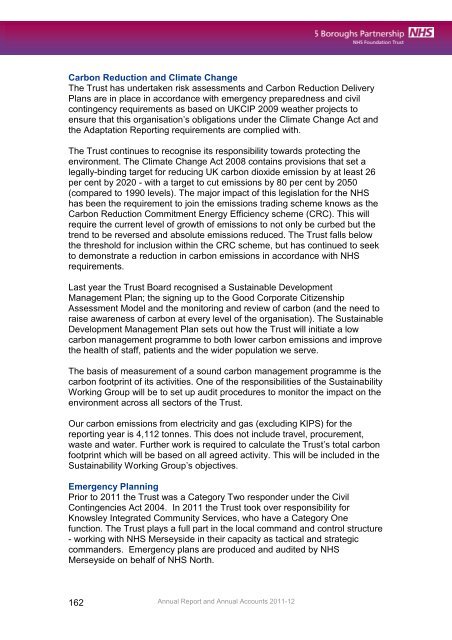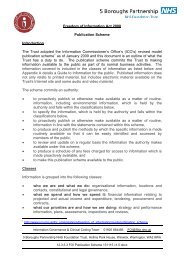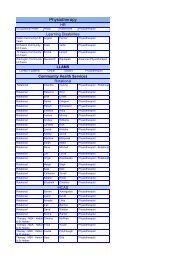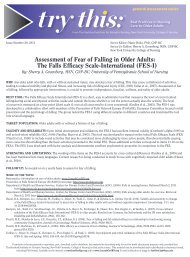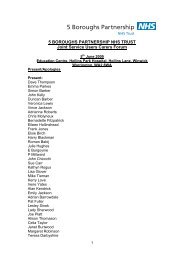5 Boroughs Partnership NHS Foundation Trust Annual ... - Monitor
5 Boroughs Partnership NHS Foundation Trust Annual ... - Monitor
5 Boroughs Partnership NHS Foundation Trust Annual ... - Monitor
You also want an ePaper? Increase the reach of your titles
YUMPU automatically turns print PDFs into web optimized ePapers that Google loves.
Carbon Reduction and Climate Change<br />
The <strong>Trust</strong> has undertaken risk assessments and Carbon Reduction Delivery<br />
Plans are in place in accordance with emergency preparedness and civil<br />
contingency requirements as based on UKCIP 2009 weather projects to<br />
ensure that this organisation’s obligations under the Climate Change Act and<br />
the Adaptation Reporting requirements are complied with.<br />
The <strong>Trust</strong> continues to recognise its responsibility towards protecting the<br />
environment. The Climate Change Act 2008 contains provisions that set a<br />
legally-binding target for reducing UK carbon dioxide emission by at least 26<br />
per cent by 2020 - with a target to cut emissions by 80 per cent by 2050<br />
(compared to 1990 levels). The major impact of this legislation for the <strong>NHS</strong><br />
has been the requirement to join the emissions trading scheme knows as the<br />
Carbon Reduction Commitment Energy Efficiency scheme (CRC). This will<br />
require the current level of growth of emissions to not only be curbed but the<br />
trend to be reversed and absolute emissions reduced. The <strong>Trust</strong> falls below<br />
the threshold for inclusion within the CRC scheme, but has continued to seek<br />
to demonstrate a reduction in carbon emissions in accordance with <strong>NHS</strong><br />
requirements.<br />
Last year the <strong>Trust</strong> Board recognised a Sustainable Development<br />
Management Plan; the signing up to the Good Corporate Citizenship<br />
Assessment Model and the monitoring and review of carbon (and the need to<br />
raise awareness of carbon at every level of the organisation). The Sustainable<br />
Development Management Plan sets out how the <strong>Trust</strong> will initiate a low<br />
carbon management programme to both lower carbon emissions and improve<br />
the health of staff, patients and the wider population we serve.<br />
The basis of measurement of a sound carbon management programme is the<br />
carbon footprint of its activities. One of the responsibilities of the Sustainability<br />
Working Group will be to set up audit procedures to monitor the impact on the<br />
environment across all sectors of the <strong>Trust</strong>.<br />
Our carbon emissions from electricity and gas (excluding KIPS) for the<br />
reporting year is 4,112 tonnes. This does not include travel, procurement,<br />
waste and water. Further work is required to calculate the <strong>Trust</strong>’s total carbon<br />
footprint which will be based on all agreed activity. This will be included in the<br />
Sustainability Working Group’s objectives.<br />
Emergency Planning<br />
Prior to 2011 the <strong>Trust</strong> was a Category Two responder under the Civil<br />
Contingencies Act 2004. In 2011 the <strong>Trust</strong> took over responsibility for<br />
Knowsley Integrated Community Services, who have a Category One<br />
function. The <strong>Trust</strong> plays a full part in the local command and control structure<br />
- working with <strong>NHS</strong> Merseyside in their capacity as tactical and strategic<br />
commanders. Emergency plans are produced and audited by <strong>NHS</strong><br />
Merseyside on behalf of <strong>NHS</strong> North.<br />
162<br />
<strong>Annual</strong> Report and <strong>Annual</strong> Accounts 2011-12


